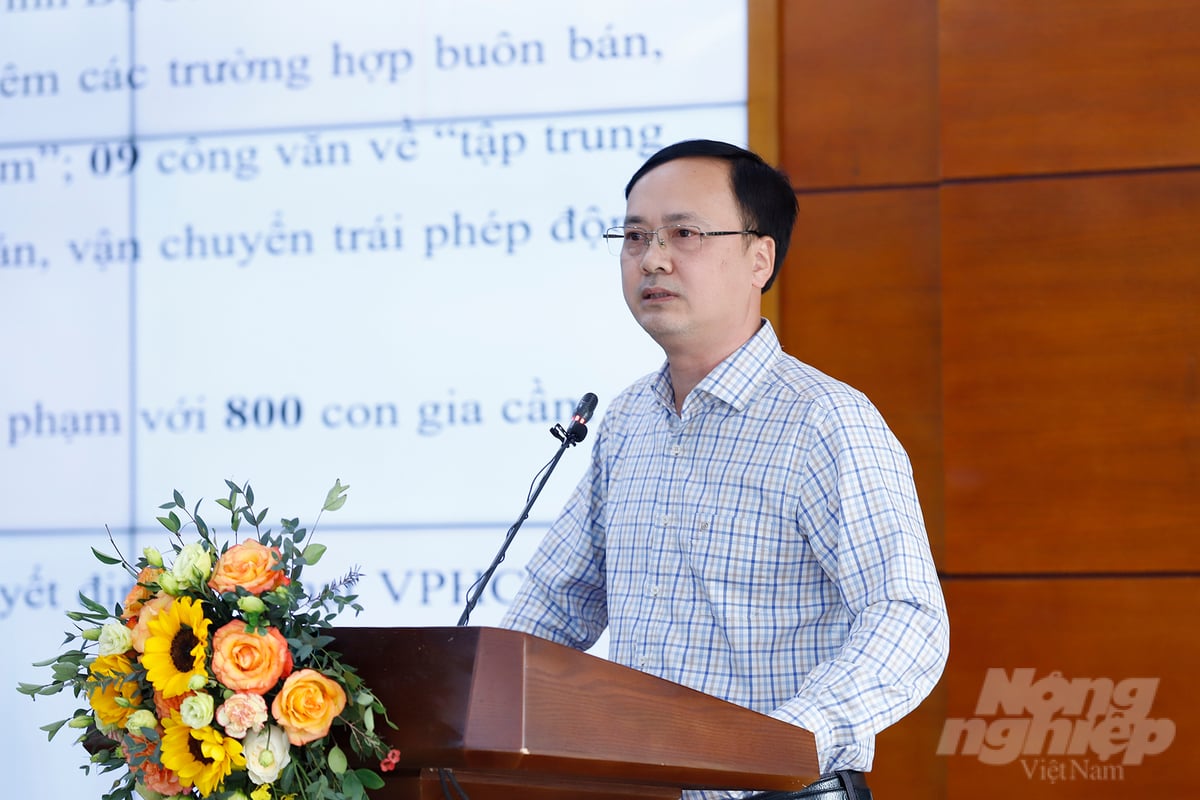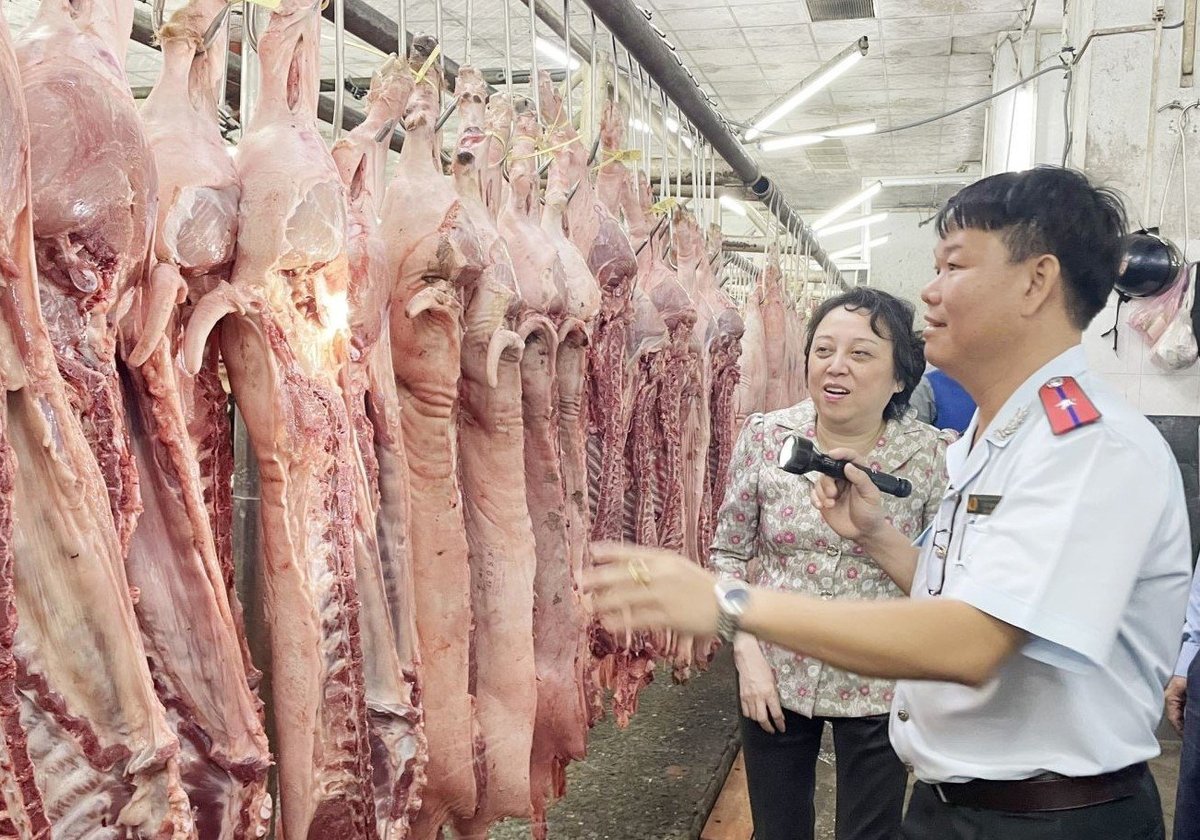December 23, 2025 | 16:21 GMT +7
December 23, 2025 | 16:21 GMT +7
Hotline: 0913.378.918
December 23, 2025 | 16:21 GMT +7
Hotline: 0913.378.918
At the Conference on “Disease prevention and pig farming development in the new situation”, Mr. Phan Quang Minh, Deputy General Director of the Department of Livestock Production and Animal Health (Ministry of Agriculture and Environment - MAE) said, “Reports from localities showed that in the first 3 months of 2025, dangerous diseases in livestock continued to be well controlled nationwide.”

According to Deputy Director Phan Quang Minh, localities must review all pig farming data to see whether it is close to reality. Photo: Khuong Trung.
African swine fever (ASF) has decreased both in terms of the area of the epidemic and the level of damage. The number of provinces suffering from ASF decreased by more than 57% and the number of outbreaks decreased by more than 72%. The number of dead and culled pigs decreased by nearly 80%.
Foot-and-mouth disease (FMD) has also decreased in both the area of epidemic and the level of damage. The number of FMD outbreaks decreased by more than 92%, the number of infected animals decreased by more than 89% and there were no livestock sick or destroyed. The situation took a fairly positive turn, thus creating conditions for livestock development, with an estimated growth rate of 5.2 - 5.5%, ensuring food supply for domestic consumption and boosting exports.
Localities have laid out many reasons for the current situation, but mainly revolve around two issues. The system of veterinary management agencies at the grassroots level is in turmoil, limited human resources cause difficulties and inadequacies in the work of slaughter control, veterinary hygiene inspection, and food safety management. The demand for sufficient allocation of funding for disease prevention and control still has ample limitations, particularly at the district and commune levels.
“These are common difficulties, not only occurring in one year but have been predicted early and clearly seen throughout the years. The legal documents on livestock are basically complete. The national programs and plans, the Prime Minister's Directives, and the instructions of the MAE are very detailed and specific for each disease and each period. Therefore, the most important thing now is how localities, businesses and livestock farmers organize operations and implement,” said the Deputy Director of the Department of Livestock Production and Animal Health.
To develop sustainable pig farming, Deputy Director Phan Quang Minh believed that localities must urgently strengthen veterinary work at district and commune levels, overcome challenges in disease prevention and control, and make constant reports on disease data. Local authorities should organize inspections, and promptly detect and strictly handle cases of supplying and trading vaccines that do not ensure quality.

The Department of Livestock Production and Animal Health requires localities to increase inspections and surprise checks of slaughterhouses and strictly handle violations. Photo: Khuong Trung.
In addition, it is required to strictly implement the reporting of animal diseases on the online reporting platform of Vietnam Animal Health Information System (VAHIS), use disease data on VAHIS to synthesize and report according to the requirements of local authorities, avoid excessive reporting forms to reduce pressure on veterinary agencies as well as commune-level veterinary forces.
Local authorities should urgently direct the development, approval, and allocation of funds for the prevention and control of livestock, poultry and aquatic diseases in 2025 following the provisions of the Veterinary Law and the directive of the MAE. It is also essential to strengthen inspection and increase surprise food safety checks at animal slaughterhouses.
Cases of violations must be thoroughly handled under the law. This includes any animal slaughterhouses that have not been licensed to operate, do not ensure veterinary hygiene and food safety conditions and are not controlled by veterinary staff as per regulations.
The veterinary systems at the commune and district levels play a very important role. They are the force that closely monitors the situation within the locality, and grasps the disease developments most accurately and quickly. They are considered “an extended arm” to help the higher-level veterinary management agency quickly deploy measures when disease outbreaks occur. However, the current restructuring of the organizational system in localities is taking place, so it is necessary to study specific policies further to strengthen the local veterinary force.
Translated by Samuel Pham

(VAN) The 2025 Joint Response Plan (JRP) identifies three core priorities and calls for $96.2 million to support disaster recovery for 1.4 million people.

(VAN) Risk assessment methodology enables early risk identification, rational resource allocation, and the development of control measures tailored to the food value chain.

(VAN) Once considered a waste product to be burned, rice straw in the Mekong Delta is now being collected and processed through mechanization and biotechnology, paving the way for a sustainable circular agricultural model.

(VAN) Risk assessment in food safety management not only helps protect public health but also promotes sustainable development.

(VAN) Prime Minister chaired the 26th meeting of the National Steering Committee on Illegal, Unreported, and Unregulated (IUU) Fishing.

(VAN) Cuba is currently streamlining procedures to attract investors, with many new policies shaped by the practical experiences of Vietnamese projects operating in the country.

(VAN) Patrol Team No. 15 has been executing patrol, inspection, and control duties in the Southwest waters, a region identified as having a high risk of violations.